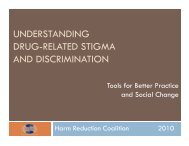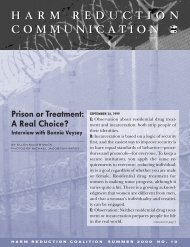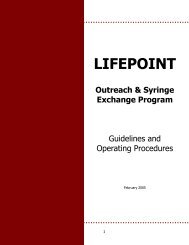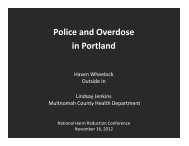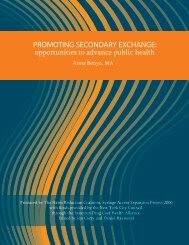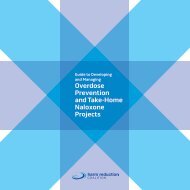9th - Harm Reduction Coalition
9th - Harm Reduction Coalition
9th - Harm Reduction Coalition
Create successful ePaper yourself
Turn your PDF publications into a flip-book with our unique Google optimized e-Paper software.
<strong>9th</strong><br />
National <strong>Harm</strong> <strong>Reduction</strong> Conference<br />
FROM PUBLIC HEALTH TO SOCIAL JUSTICE<br />
abstinence-based aspects of project-based HF make it compatible with the broader set of harm-reduction approaches. In<br />
the first half of this workshop, we will define the project-based HF model and recount its historical development. Next, we<br />
will discuss the principles of project-based HF and insights into its day-to-day implementation in a population of chronically<br />
homeless individuals with alcohol problems. In the second half, we will present findings from the research partnership<br />
between the University of Washington (UW) and Seattle’s Downtown Emergency Service Center (DESC) that show significant<br />
associations between project-based HF and reduced harm for affected individuals and their community. Specifically, we<br />
examined the associations between project-based HF and two-year alcohol use, substance-use treatment attendance, motivational<br />
factors, and criminal justice outcomes. Although project-based HF was not associated with increased formalized<br />
treatment attendance, residents nonetheless showed significant decreases across alcohol and criminal justice outcomes<br />
as a function of time in housing and their own intrinsic motivation to change. Further efforts to decrease alcohol-related<br />
problems via harm reduction interventions will be discussed.<br />
Susan E. Collins, PhD, is a licensed clinical psychologist and Research Assistant Professor at the University of Washington –<br />
Harborview Medical Center. She specializes in substance use treatment and research and has published over two dozen journal<br />
articles and book chapters. Since 2007, she has been part of the UW team working with DESC to evaluate its project-based HF<br />
approach.<br />
Cooke, Mark, ACLU of Washington, Seattle, WA<br />
mcooke@aclu-wa.org<br />
Implementing Portugal’s Decriminalization Laws in the U.S.<br />
In 2001, Portugal decriminalized the possession of all drugs intended for personal use. This groundbreaking policy change<br />
has successfully kept individuals out of the criminal justice system and connected them with services. It has not led to<br />
increases in drug usage or drug tourism. But can this type of system ever be implemented in the United States Although<br />
adopting a system identical to Portugal’s in a state or local jurisdiction in the United States is unlikely in the immediate future,<br />
a variety of legislative and policy changes can be adopted, now, that are similar to Portugal’s law. As we’ve seen with<br />
the introduction of drug courts and diversion programs, drug de-penalization policies can survive politically in the War on<br />
Drugs. However, these policies still criminalize drug possession and rely on the discretion of courts and prosecutors to<br />
operate, which can lead to arbitrary enforcement. What are needed are broader policies that decriminalize drug possession<br />
and offer services for all offenders. To that end, policies and legislation can be introduced that more broadly apply decriminalization<br />
principles to drug use. This panel presentation will focus on legislative strategies that will put state and local<br />
jurisdictions on the path to full decriminalization.<br />
Data Visualization – Marijuana Enforcement in WA<br />
Statistics are a valuable tool when advocating for changes to drug policy and highlighting the effectiveness of harm reduction<br />
practices. They allow people to tell complicated stories in an efficient manner. Unfortunately, statistics are frequently<br />
used in a dry and unclear manner which limits their impact. One way to avoid this is to use visually appealing representations<br />
of data, such as graphs, tables, and maps. These visualizations are pleasant to look at and make complicated statistics<br />
easy to understand. Luckily, a variety of new software tools now exist which make it easy to turn boring data into more user<br />
friendly visualizations. This panel presentation will provide examples of data visualizations that specifically focus on drug<br />
policy and harm reduction. It will also provide strategies for obtaining good data and compiling it in a manner suitable for<br />
public use. A recent data visualization project focusing on the enforcement of marijuana laws in Washington State will serve<br />
as the primary illustrative example for this presentation.<br />
Mark Cooke is a Policy Advocate with the ACLU of Washington working on drug policy issues. He graduated from Washington University<br />
in St. Louis in 2007 with a law degree and a master’s in social work. While in St. Louis, he worked at the Missouri Institute of<br />
Mental Health researching drug policy issues, including methamphetamine laws and needle exchange programs. Prior to joining<br />
the ACLU, Mark practiced family law in Seattle. Before going to graduate school, he worked in the foster care system<br />
22



